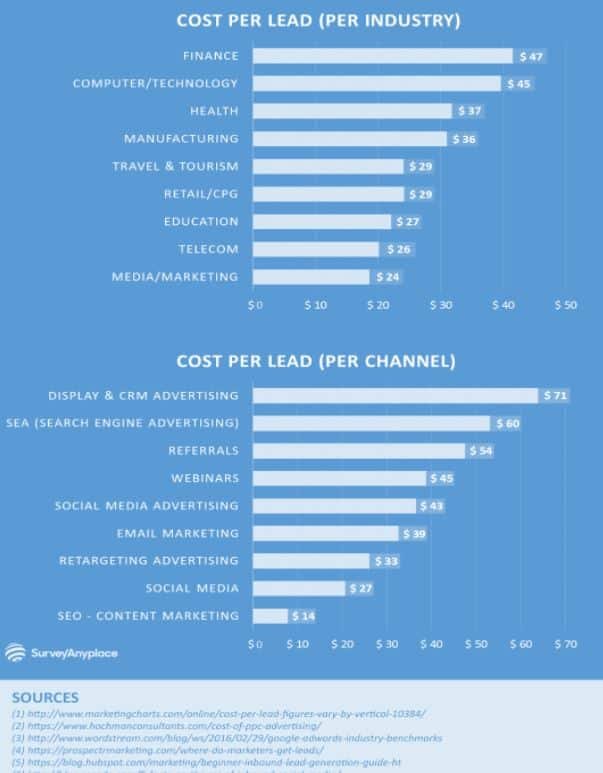SEO
SEO Vs. PPC: Which is Better For Your Business?

If you want to promote your business in the digital age, you need to take advantage of online marketing opportunities.
There are countless ways to plug your products and services on the web. But deciding which platforms or techniques to use can be challenging – even for experienced professionals.
Of the many different digital marketing options available, the main choice may come down to search engine optimization and pay-per-click advertising. Knowing which one is best for your business needs can help you stay ahead of the game.
Let’s take a closer look at the SEO vs. PPC debate and how to make the right decision for your marketing strategy.
[lwptoc]
Understanding Search Engine Optimization
First, let’s define search engine optimization. Also known as SEO, this involves making both on-site and off-site adjustments that can make your website and brand easier to find online. In making your site more appealing to search engines, you’ll also make it more valuable for web users.
There are a variety of ways to optimize a website, including the use of relevant keywords, publishing in-depth content, improving the user experience (including mobile accessibility), and increasing domain authority by acquiring high-quality backlinks.
Search engine optimization is meant to drive traffic and build brand awareness over time. Rather than explicitly promoting your products, services, or company, SEO aims to help your audience with the problems they face. It’s a long-term solution that focuses on organic growth. This ultimately strengthens your brand’s visibility online in a way that both customers and search engines can trust.
The flip side here is that SEO takes longer to take effect. Because it’s designed for gradual growth, you won’t see overnight results with an SEO campaign. It can take three to six months, in many cases, to start seeing real progress in search engine results pages (SERPs).
That can be frustrating at first, so setting realistic expectations is key. Even though you won’t experience instantaneous growth, you’ll get more out of your marketing budget with SEO.
Not only is SEO extremely affordable on its own, but it’s also one of the most cost-effective lead generation tools available. As you can see from the chart below, SEO has the lowest cost-per-lead rate out of the most popular marketing techniques used by businesses across numerous industries.

Source: SurveyAnyplace
What’s more, your investment will go further with SEO. The work you do to optimize your site today will continue to drive traffic and awareness months and even years into the future. Unlike other forms of online marketing, SEO doesn’t stop – even if you discontinue these services later. That means you’ll continue to get more for your money with SEO.
However, SEO works best when you put in a consistent effort. Google likes sites that are updated regularly and that provide value consistently. So it’s best if you don’t stop your SEO efforts. If you find you need to cut down on certain aspects of your marketing strategy, it’s smart to keep optimizing your site and find other places to reduce costs. (Since SEO is so affordable anyway, it makes sense to look at higher-cost tasks!)
It’s worth noting that SEO trends do change over time. As Google’s algorithm becomes more sophisticated, certain tactics become outdated and ineffective. If you want to optimize your website effectively, you’ll want to stay on top of industry best practices – or hire a professional to do this for you.
In the same vein, it’s important to understand that SEO isn’t something you can learn in a week. While certain concepts are easier to grasp than others, you won’t become an expert right away. And trying to take shortcuts can result in big problems for your brand. If you go against Google’s guidelines when optimizing your site, you could risk rankings loss or even penalization.
If you follow expert recommendations, however, you shouldn’t have a problem. By providing valuable and accessible website content for all users, you’ll inherently deliver what search engines want to see.
SEO requires a bit of patience and a good amount of expertise. But since it’s all about providing value to the end user, it can be a great way to drive traffic and build your brand reputation in a way that’s meant to last.
Pay-Per-Click Advertising Explained
Pay-per-click advertising, or PPC, is just one way to run ads online. PPC differs from display ads, which appear as visual banner-style ads on a variety of websites. You’ve probably seen PPC ads appear in the top few rows of search engine results pages.
The first few results have a little “sponsored” designation next to them. This is a subtle way to let the web user know that these results appear where they do because they’re actually advertisements. But that tag often goes unnoticed – which is just one reason why PPC ads are so effective.
PPC ads can be pricier than other forms of marketing. Although you won’t have to pay until your ad is clicked, it’s important to remember that the cost of your ads can vary depending on the competitiveness of the keyword bids or even your Google Ads quality score.
And if you happen to bid on keywords that have high search volume but that don’t align with user intent, you might end up getting lots of clicks with very few conversions – meaning your advertising budget will quickly run out without much to show for it.
But if you manage your PPC campaigns properly, your brand can benefit greatly. PPC ads are an excellent way to drive traffic to a website within a short period of time, making them an ideal choice for newly launched businesses or limited-time offers.
That said, it’s worth noting that your advertising campaign typically won’t have long-lasting effects. After the campaign ends, you may not see much residual web traffic. What’s more, you won’t maintain your coveted place in search results once your ads cease to run. However, you’ll have more visibility into exactly where your money is going and where changes can be made.
Speaking of visibility, another benefit of PPC is that it allows for more precise audience targeting than other marketing tactics. You can really focus on the people you want to reach by keyword selection, location, language, device, and even time of day or week. This can help you make more granular decisions regarding your advertising that will translate into real results. It’s also great for experimentation, as you can easily test ads to ensure effectiveness.
Still, PPC ads won’t last forever. Campaigns can actually lose effectiveness over time, particularly if they aren’t regularly updated and monitored. You’ll have to constantly adjust your ads and create new ones if you plan on making PPC part of your long-term marketing strategy.
Like other types of marketing, PPC does require industry knowledge. It also requires a monetary investment. While your ads will launch right away, you may not see the results you want within days. And even if you do, you’ll need to keep tinkering with your ads to maintain or improve those results over time.
But if you work with knowledgeable professionals and educate yourself on PPC best practices, this can be a viable way to drive traffic and sales.
How to Choose Between SEO and PPC
With all of this information in mind, it can be tough to know which option to choose when marketing your business.
SEO and PPC work very differently. While SEO is meant to drive organic traffic and awareness over a longer period of time, PPC is designed for quick results.
Usually, it’s best to first consider your goals and your budget when making this decision. Do you want to improve brand awareness or are you looking to make the most sales you can within a week? Do you have a limited budget to work with or are you okay with spending money to make money? The answers to these kinds of questions will help you zero in on the best choice.
You may also need to consider some other practical points. The phase of your business, for example, might play a role in your decision-making process.
For example, if you’ve just launched your website and don’t yet have a blog, it may not be the right time to start an SEO campaign. You might be more focused on selling one or two products on your site instead. In this scenario, PPC may be the best choice.
But if you’re a well-established business currently experiencing the off-season within your industry, this could be a great opportunity to improve your website’s SEO. A swimming pool company, for instance, might want to take advantage of the winter months to build an SEO campaign behind the scenes and start ranking on keywords that will become more competitive come summer.
It’s also worth considering your competition when making this choice. If you’re directly competing with popular online retailers like Amazon, you might want to consider PPC over SEO – simply because you’ll never be able to rank on the same search terms as this corporate giant. But if you’re a locally-owned business that needs a small boost and you don’t have too many big competitors in your area, a local SEO campaign could work wonders.
Of course, there is a third option: using both SEO and PPC at the same time.
SEO and PPC Work Better Together
Because SEO and PPC are so different, they actually complement each other beautifully. Where one marketing tactic excels, the other is lacking – and vice versa.
If you have the means to do so, you may want to consider running SEO and PPC campaigns in tandem. These campaigns will actually support one another, driving traffic to your site immediately while building your online brand presence over time.
You can also use the data you gather from your PPC campaigns to improve your SEO results. By testing your strategy with PPC first, your optimizations will often be more successful. Plus, diversifying your strategy is always a good thing. You’ll benefit from the stability of SEO while being able to experiment with PPC – all while minimizing risk.
Understanding the perks and pitfalls of both SEO and PPC can allow you to create a stronger marketing strategy overall. On its own, each option can help you succeed. But when used together, these two tactics can take your business to the next level.
Related: Search Engine Optimization vs. Conversion Rate Optimization: Which Is Better?
-

 Celebrity4 weeks ago
Celebrity4 weeks agoIs YNW Melly Out Of Jail? What Is The YNW Melly Release Date, Career, Early Life, And More
-

 Sports4 weeks ago
Sports4 weeks agoMore Than Just a Game: How College Sports Can Shape Your Future
-

 Tech3 weeks ago
Tech3 weeks agoAI Software: Transforming the Future of Technology
-

 Tech3 weeks ago
Tech3 weeks agoAll About Com. Dti. Folder Launcher: Features, Benefits, Tips, And More













